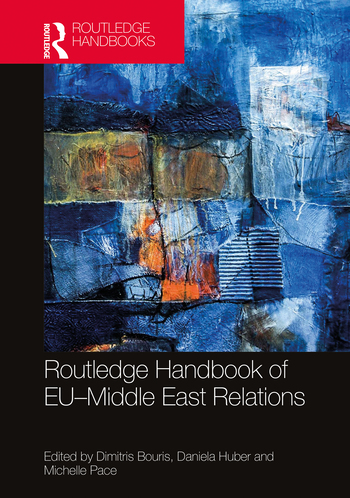The first edition of the Routledge Handbook of EU–Middle East Relations, edited by Dr Dimitris Bouris, Dr Daniela Huber and prof Michelle Pace, is ready and available for pre-order.
This Handbook builds upon work and research stemming from a grant received from the Erasmus+ Programme of the European Union for the establishment of a Jean Monnet Network on EU-Middle East Relations (EUMENIA) which is led and co-ordinated by Dimitris Bouris and the University of Amsterdam. The network includes seven more partners namely Roskilde University, Denmark (Michelle Pace), Istituto Affari Internazionali, Italy (Daniela Huber), University of Peloponnese, Greece (Nikolaos Tzifakis and Maria Gianniou), Yaşar University, Turkey (Gökay Özerim, Emre İşeri, and Aylin Güney), Birzeit University, Palestine (Lourdes Habash), American University of Beirut, Lebanon (Karim Makdisi) and the University of Jordan, Jordan (Wissam Hazimeh).
Chapters:
Part I (Historical Constructions/Perspectives) helps place EU-Middle East relations into a historical context
In chapter 2, @SenemAydnDzgit, Johanna Chovanec, & Bahar Rumelili demonstrate how representations of the other and the self were often linked to political events pertaining to Europe and the Ottoman Empire.
In chapter 3, Sune Haugbølle and @robbyref trace the impact and legacy of French and British Colonialism in the Middle East and North Africa.
In chapter 4, Nora Lafi focuses on “Longue Durée” reflections on anti-colonial movements in the Middle East from 1798 up until this day.
In chapter 5, @ssen03 offers a postcolonial critique of EU-Middle East Relations.
Part II examines a number of theoretical approaches and perspectives in the study of EU-Middle East relations.
Chapter 6 focuses on the “Everyday Middle Easts”. @alibilgic demonstrates the power of naming a geographical space and how this essentialises and instrumentalises a certain Middle East for European/Western geopolitical interests.
In chapter 7, Münevver Cebeci explores how the EU constructs the Middle East in its relations with various actors in the region.
In chapter 8, Zeynep Arkan Tuncel locates the EU as a security actor and explores implications with regards to the EU’s relations with the Middle East.
In chapter 9, @FilippoDionigi analyses EU-Middle East relations through the lenses of IR theory.
In chapter 10, Fred H. Lawson analyses EU-Middle East relations through the lenses of comparative politics.
In chapter 11, @FisherOnar analyses EU-Middle East relations through the lenses of postcolonial theory.
In chapter 12, @HLMuehlenhoff explores EU-Middle East relations through the lenses of gender.
Section III focuses on multilateralism and geopolitical perspectives.
In chapter 13, Virginie Mamadouh offers a political geography perspective on EU-Middle East Relations by focusing on their spatiality.
In chapter 14, @sferabolli23 tackles EU and Arab regionalism.
Chapter 15 by Tobias Schumacher focuses on relations between the EU and the Gulf Cooperation Council (GCC).
Chapter 16 by @IGalariotis and Maria Gianniou focuses on European cooperation with the UN in the Middle East.
In chapter 17, @AndreaDess2 & @VNtousas explore the transatlantic relationship and its impact on the Middle East.
In chapter 18, Meltem Müftüler-Baç & @DamlaCihangir explore the EU-Turkey relations and the Middle East.
In chapter 19, @m_suchkov & Polina Vasilenko study the EU-Russia relations in the Middle East.
Section IV examines contemporary issues in the study of EU-Middle East relations.
@a_teti, @masritali and @Pamela Abott analyse, in Chapter 20, the perceptions of the EU from activists’ point of view and public opinion in the Middle East.
@AyhanKaya14 explores populist politics in Europe and their impact on EU-Turkey relations in Chapter 21.
In chapter 22, @pardosharon and Dani Filc focus on the impact of national populism in EU-Israel relations.
In chapter 23, Lardi Sadiki and Layla Saleh investigate the explosion of the Arab ‘hirak’ (peoplehood) and the “democratic didactic loop”.
In chapter 24, Djallil Lounnas zooms in on the relations between moderate Islamist parties in the MENA and the EU.
Chapter 25 by Eleonora Insalaco tackles inter-religious dialogue in the Euro-Mediterranean region.
Chapter 26 by Gerasimos Tsourapas focuses on EU-Egypt Relations.
In chapter 27, Annette Jünemann tackles gender issues.
Peace, security and conflict are the main focus of part V.
In chapter 28, @F_Bicchi and Benedetta Voltolini analyse the EU’s role in the Israeli-Palestinian conflict.
In chapter 29, Assem Dandashly focuses on EU-Lebanon relations.
In chapter 30, Maria Luisa Fantappie explores the EU’s role in post-2003 Iraq.
In Chapter 31, Oz Hassan explains how the current EU-Afghanistan relationship has been textured by its past.
In Chapter 32, Anis Nacrour and Jouanah Ghori analyse the “stop and go process” which characterises EU-Syria relations.
Vincent Durac in chapter 33 explores the EU’s role in Yemen.
In chapter 34, Cornelius Adebahr and @Ric_Alcaro explain how EU-Iran relations are intertwined with each side’s relations with the United States (US).
In chapter 35, Francesco Milan examines the EU’s evolving relations with MENA countries in the field of counter-terrorism.
The final section, Part VI, is devoted to issues of development, economics, trade and society.
Emile Badarin and @jeremywildeman analyse EU development aid in the Middle East.
@beste_isleyen and @Tamyfakhoury zoom in the politics of borders, migration and refugees in EU-Middle East Relations.
In chapter 38, Emma Murphy examines the relationship between the EU and youth in the MENA.
In chapter 39, Nora Aboushady and @ChahirZaki assess EU-Middle East trade relations, patterns, policies and imbalances.
In chapter 40, David Wearing explores EU-Middle East arms sales and military cooperation.
In the final chapter, chapter 41 of the Handbook, by @MKeulertz and @Musa McKee analyse EU-MENA environmental relations.

